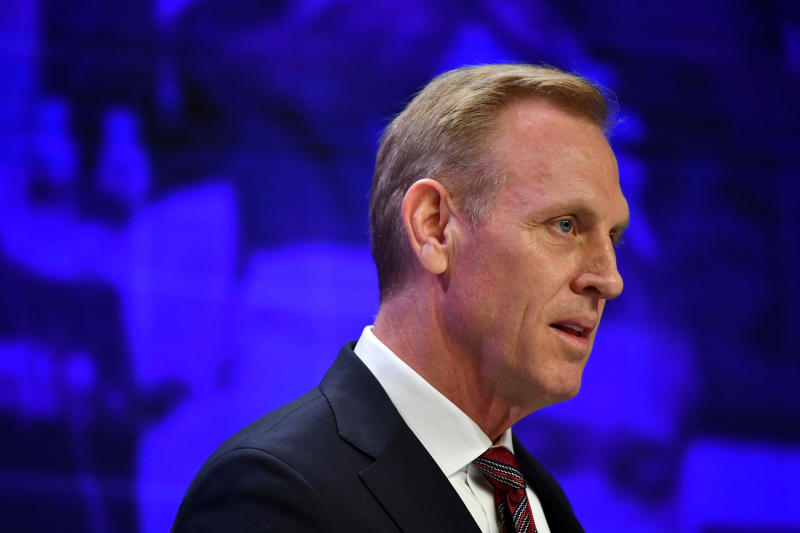Shangri-La Dialogue: Shanahan makes a splash by raising thorny issues
Sign up now: Get ST's newsletters delivered to your inbox

United States Acting Secretary of Defence Patrick Shanahan on stage before the opening of Shangri-La Dialogue on June 1, 2019.
ST PHOTO: LIM YAOHUI
SINGAPORE - As a debutant on the Asia-Pacific stage, United States Acting Defence Secretary Patrick Shanahan made quite a splash.
Even before his first major speech in Asia, which was delivered on the second day of the Shangri-La Dialogue on Saturday (June 1), Mr Shanahan hit the headlines when he hailed as "constructive and positive" his much-anticipated meeting with his Chinese counterpart General Wei Fenghe in the midst of a growing rift between Washington and Beijing.
A day later, he captured the headlines yet again, this time with a swipe at China. Without mentioning it by name, he said it subverted the rules-based order and posed the greatest long-term threat to the region. Using the Trump administration's preferred term, Indo-Pacific, he declared it was a "priority theatre" for the US. Bringing a sense of urgency to Washington's decades-old presence in the region, he promised to usher in "a new age of technology, partnerships, and posture."
Three things stood out in his speech.
One, an emphatic assertion that the US is an insider to the Asia-Pacific. Perhaps in anticipation of Gen Wei's remarks on Sunday that "outsider" forces were destabilising the region, Mr Shanahan talked of a "shared geography" and a "natural presence" for the US here.
"We are a Pacific nation. We are a resident power, with deep economic, cultural, and personal connections that inextricably link us with the growth and vitality of the world's most dynamic region."
Two, Mr Shanahan insisted that the US walks the talk as a veteran provider of security and prosperity to the region, going on to list the many ways in which the US is invested in the region and pointedly comparing it with China's.
"America's annual two-way trade here is US$2.3 trillion (S$3.1 trillion), and US foreign direct investment is US$1.3 trillion, more than China's, Japan's and South Korea's combined," he said.
His third, and most controversial proposition, was that China, which he did not explicitly name, was undermining the region with aggressive militarisation, predatory economics and influence ops. To a region where China is a major economic partner, a neighbour and a source of cultural heritage, this is difficult to swallow.
For some analysts, behind Washington's renewed interest in the region lies a nation staring at the possibility of being upstaged by China. Others trace the ticking up of US-China rivalry to the Trump administration. A whisper heard in the corridors of the Shangri-La Hotel was that Mr Shanahan's speech was actually a softer version of what might have been delivered, had another more hawkish aide had his way.
Challenged to identify the new element in his presentation - after all the Indo-Pacific strategy has been aired in previous years by President Donald Trump, Vice-President Mike Pence and former defence secretary James Mattis - Mr Shanahan's answer was short: bipartisan backing in Congress, which made money flow.
"The resourcing of this strategy is different. In the past, we had strategy, we didn't have the resources, we didn't have the funding," he said.
Not everyone was convinced. Mr Asanga Abeyagoonasekera, the director-general of Sri Lanka's Institute of National Security Studies, told The Straits Times, flatly: "I don't see a huge difference."
Nor was he buying Mr Shanahan's argument that China had designs on the region. "No one can deny the US foreign policy has had liberal, hegemonic interventions, whether in Iraq, Libya or Syria," he said.
"China doesn't do that, it clearly wants connectivity, economic development, a shared future."
To Mr Tetsuo Kotani, a senior fellow at the Japan Institute of International Affairs, the Chinese general stole the show.
"One question I had before coming here was why the Chinese defence minister decided to come - whether it was from anxiety or confidence. I got the impression that he came because he was confident that he could deliver his own thinking to the audience," Mr Kotani said.

While Mr Shanahan tried to avoid the tough questions, Gen Wei appeared game. "I was kind of surprised. He didn't avoid Taiwan, the Uighur camps and other sensitive issues," Mr Kotani said, before adding: "With Chinese narrative, of course. He followed the party line."
"Not in terms of reassurance, but in terms of performance, the Chinese general did better", was his verdict.
For those fearing a worsening of superpower hostilities, a point to ponder was whether Mr Shanahan bore the more conciliatory message than Gen Wei, or did he stoke the fire?
To Mr Abeyagoonasekera, it was the US who raised the thorny issues, bringing them closer to the conflict. "You can see that because the replies were coming from the Chinese," he said.
Mr Kotani disagreed. "Sometimes you need to raise the sensitive issues to preserve stability," he told ST.


